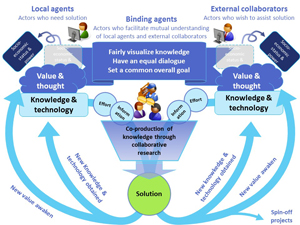Knowledge binding to overcome perception gaps in collaborative research on socio-environmental interaction

Figure 1: Proposed method to overcome the perception gap between local agents and external collaborators
Global environmental issues are caused by disturbances in the interaction between societies and the natural environment. To better understand those causes, it is necessary to integrate the social and environmental knowledge to identify the compounding factors. Moreover, to improve socio-environmental interactions, collaborators need to work towards solutions by combining technological, governmental, social, and environmental knowledge. Contributors include researchers and a number of diverse societal actors, including national and local governmental agencies, industrial companies, non-profit organizations, and residents. However, difference in the perception of issues between researchers and actors may disrupt the process of finding successful solution.
In collaboration with RIHN’s research projects, this Core Project develops a methodology to overcome the gaps caused by misperceived issues. We suggest putting “binding agents” between local actors and external collaborators (Figure 1). The binding agents visualize the knowledge of local and external actors in a fair manner, by using tools such as graphic recording (method to illustrate speech simultaneously), ontology (computer-based method to structure the vocabulary system), and geographical information systems (GIS; computer-based mapping). Using these visualization tools, the agents facilitate workshops to have an equal footing dialogue to share different values and thoughts, and facilitate the setting of common overall goals beyond differences in socio-economic status and interests.
During the Feasibility Study, we improve this research model through reviewing case studies, including the project to develop a new social network to utilize waterweed resources in the Lake Biwa catchment area, central-west Japan (financially supported by the Mitsui & Co. Environmental Fund).
▲PAGE TOP